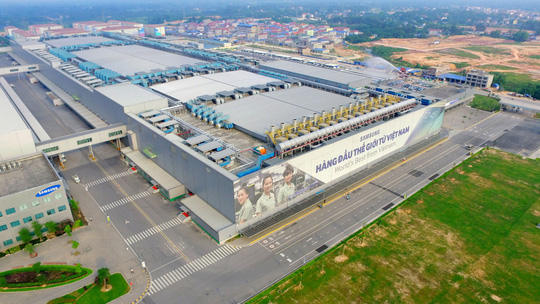Vietnamese Enterprises Try To Squeeze Into Global Production Chains


Vietnam has been urged to develop supporting industries
An expert on the electronic industry said Vietnam once had an opportunity to develop its supporting industries after approving a number of joint ventures between Vietnamese and foreign partners.
From 1993-1995, Japanese corporations such as Sony, Panasonic, JVC and Toshiba, one after another, came to Vietnam to set up joint ventures.
Vietnam pursued a policy to attract foreign investors to establish joint ventures, restrict imports and encourage exports with tariff barriers.
Foreign investors who wanted to enter the Vietnamese market had to build their production bases in Vietnam, because they would have had high tariffs if they only focused on trade activities. |
Foreign investors who wanted to enter the Vietnamese market had to build their production bases in Vietnam, because they would have had high tariffs if they only focused on trade activities.
In joint ventures, Vietnamese enterprises hoped to learn from foreign partners and later become the ‘backbone’ of the national economy.
Foreign investors who registered investment projects in Vietnam at that time all had to make commitments on the localization ratio, i.e. locally made content in their products.
However, the plan to gradually increase the localization ratio failed because of the lack of a reasonable supervision policy.
Many joint ventures did not use their profits to re-invest in their core business fields, but poured money into other fields, especially real estate.
Many joint ventures terminated operations, Vietnam joined many FTAs, and supporting industries did not develop as expected.
“Regrettably, we have overlooked the opportunity to build infrastructure for basic industry, so there is a big gap in production capability between domestic and foreign invested enterprises (FIEs),” he said.
In 1996, the agreement on ASEAN Industrial Cooperation (AICO) was inked by Vietnam and some ASEAN countries, under which relevant parties committed to ease export tariffs on products of multinationals operating in regional countries.
The aim of the agreement was to encourage foreign groups to increase the locally made content level and help develop local supporting industries.
An expert from Samsung in Vietnam said this was a good policy to encourage the development of supporting industries in Vietnam.
In 1998-2000, the expert visited Malaysia to find out which products Samsung Vietnam should make to enjoy preferential tariffs. However, Vietnamese enterprises could not take full advantage of the opportunity to develop supporting industries.
Weak supporting industries are a serious disadvantage in Vietnam. In principle, multinationals want to use components and accessories from domestic sources to cut production costs and optimize profits. However, very few Vietnamese enterprises are capable of joining their supply chains.
RELATED NEWS
Samsung aims to increase VN vendors to 50 by 2020
When will Vietnam’s support industries flourish?
Chi Mai
Vietjet Launches Four Routes Linking Top Destinations Of Việt Nam And India
Vietjet has officially launched four more services linking top destinations of Việt Nam and India including HCM Ci... Read more
Sacombank To Recruit 300 Staff By July
Sacombank is set to hire 300 employees by the end of July for positions like personal/corporate customer service ass... Read more
"Fly First-Pay Later" By MOVI And Vietjet Wins Technology Award
“Fly first - Pay later” is an 100 per cent online financial product that first appeared on the Vietnamese market... Read more
EXIM Thailand Opens Representative Office In HCM City, Inks Credit Deal With BIDV
The Export-Import Bank of Thailand has agreed to provide the Bank for Investment and Development of Việt Nam with ... Read more
Vietjet Launches Two Routes To India
The two newest routes, which will operate 3 and 4 round-trip flights per week respectively, are expected to continu... Read more
Vietjet Develops E-logistics, Pays 20 Per Cent Stock Dividend
The budget carrier expects to earn more than VNĐ22.3 trillion (US$959 million) in air transport revenue in 2022 Read more

